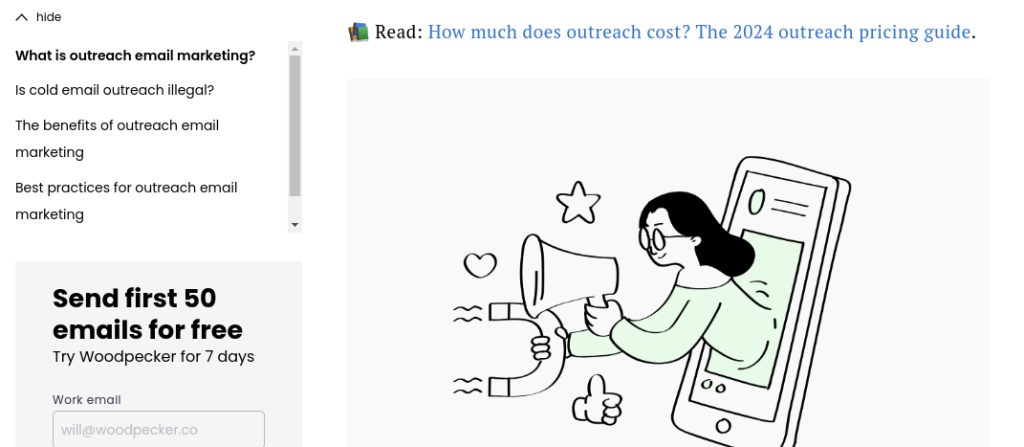Lead generation agencies are mostly used to working with email marketing, social media marketing, and PPC advertising to generate leads for their clients. However, there’s one marketing technique that these companies might be missing to promote themselves – SEO.
Even though SEO isn’t as direct of a lead generation method as working with lists of LinkedIn leads, it can provide a constant stream of leads after a couple of months of work.
In this article, you’ll learn all about how to turn your lead generation SEO agency into a successful business.
Understanding SEO in the Context of Lead Generation
Search engine optimization or SEO is the process of optimizing your website and overall online presence to fit the guidelines of search engines. The end goal of SEO is to increase the amount of relevant organic traffic and work closely with the sales team to improve conversions and increase the number of sales.
SEO has four main components:
- Keyword research
- On-page optimization
- Content creation
- Off-page optimization
Each of these can be subdivided into multiple components, and there are a lot of different techniques for doing the tasks associated with them, but most SEO jobs boil down to these four.
Keyword research helps you find keywords that are associated with your business. On-page optimization ensures the keywords appear sufficiently on the pages of your site and that your site is in line with Google guidelines in terms of technical optimization and structure.
Creating content helps you target informational keywords and increase website traffic by helping people who are in the awareness stage of the sales funnel find you. Finally, off-page optimization helps show Google that your website is trusted by other authoritative websites, which helps with ranking.
There are best practices that are the same across all industries, and some techniques are only really applicable to certain niches. For instance, e-commerce retail SEO is complicated by the fact that you have to deal with multiple product and category pages as well as handle pagination.
The practices of SEO for lead generation agencies include a lot of content marketing techniques, as there are very few keywords that have a direct transactional intent. Most people who use your services will go through a lengthy sales funnel that starts with finding information about lead generation techniques.
You can greet them at the very start of their customer journey by creating content that is informative to them and optimizing it so it appears high on SERP and can be discovered.
This guide will walk you through the main parts of SEO strategy for a lead generation agency.
The plus side is that these techniques aren’t only useful to promote your lead generation agency to potential customers. You can also use them to improve lead generation through SEO for B2B tech companies, SaaS companies, agencies, and consultants, so it’s possible to add SEO to your arsenal of lead generation tools.
Keyword Research and Optimization
One of the primary SEO jobs for a lead generation agency is keyword research. The primary way users find information on Google is by typing a keyword in the search bar. Knowing what keywords leads would use to find businesses like yours is crucial because by optimizing for all of them, you’re gathering more traffic.
If you don’t do keyword research and optimize for the keywords you come up with, your main service page will show for the keyword “lead generation services” but won’t for keywords like “get qualified SaaS leads” or “lead list generation.”
There are two main ways to do keyword research for the core business keywords, and both of them require a specialized tool. You can check out alternatives to popular SEO services here: https://top10seosoftware.com/alternatives/ and find software that benefits your business in the best way.
The first method is to find similar keywords with one of these tools. To do that, brainstorm core business ideas and put them through a keyword research tool. A tool like this will provide a few dozen keywords that are similar or related to the keywords you come up with.
Another option is to use a keyword research tool to conduct competitor analysis. This will give you a long list of keywords that your competitor ranks for. Choose a high-ranking competitor to analyze, and you’ll have hundreds of keywords that you can try to optimize your site for.
With these two techniques, you can find plenty of keywords for your home page and service pages. You’ll also need to find informational keywords that you can base your blog pages around.
That’s harder to do as not all informational keywords are directly tied to your core keywords. For instance, as a lead generation company, you can write blog posts about how to qualify leads or how to do cold outreach on LinkedIn. Both of these are within your area of expertise and will bring in leads from search.
Neither can be found by looking up keywords similar to “lead generation agency.” You can find those by brainstorming possible topics and doing a similar keyword search on them. Competitor research can also give you plenty of ideas for keywords like that.
The last keyword research task you’ll have to do is keyword grouping. You can group keywords together manually or with an SEO tool like Rankability to make sure each page has a set of keywords associated with it. This way, you don’t have to create a separate page for every keyword and consolidate traffic to a page that answers more than one keyword.
To optimize your pages the right way, make sure to add keywords to these key places:
- Title tag
- Meta description tag
- URL
- Alt tags in images
- Headline tags
- Body of the text where appropriate
Don’t add keywords to every paragraph, though, overdoing it might actually be hurting your ranking. Sprinkle the keywords where it feels like an authentic place to put them in the text, or use a tool to gauge how many keywords you need on a page.
Creating High-Quality, Lead-Generating Content
There aren’t many transactional keyword opportunities to generate leads with SEO, so the bulk of the traffic is going to come from informational keywords. To achieve that, you’ll have to create content that’s helpful for your ideal customer.
Start with creating content for the keywords you already have, and you can later expand the blog as you start getting more ideas.
The key to creating content like this is to match the search intent of the keyword you target and answer all the questions a user might have. Analyze the articles that already rank for that keyword and make yours better — cover the topic in more depth, add visual aids, or anything that helps the reader understand the topic better.
To turn content that simply attracts traffic into SEO content for lead generation, include CTAs in the text or in the sidebar.

Source: Woodpecker.io
You can also put informational content in the larger content marketing pipeline by linking to content pieces meant for the later stages of the sales funnel, like company comparisons or whitepapers.
On-Page SEO Techniques for Lead Generation
Optimizing the pages of your website for search is necessary if you want the search engines to understand what each page is about. To do that, you’ll have to add keywords to the most important places on the page, ensure that the images are easy to load, and create an internal linking structure.
In the groups of keywords that you create for each page, there are main keywords and supporting ones. Typically, the main keyword is the one with the highest traffic volume and one that corresponds to the main idea of the page, whether it’s a service page or a blog.
That keyword should be featured in the most important SEO tags of the page: title tag, description tag, and the H1 tag. It should also be a part of the URL.
Keywords that are secondary in nature could be a great fit for H2, H3, or any other headline tags. All the rest should appear naturally in the text of the page.
The next step in on-page optimization is adding links to relevant pages from the text of the page. Internal links can signal to Google what pages of your site are in more priority, and pointing to a service page from multiple blog pages can increase its rank.
You should also work on conversion rate optimization of your pages. For blog pages, you can try different text in links that point to converting actions. The service pages might need more work.
Technical SEO for a Faster, More Efficient Website
From the technical standpoint, improving on-page SEO means ensuring your SSL certificate is renewed, improving the crawlability of the site, making its structure right for both users and search engines, submitting structured data to Google, and keeping Core Web Values in high numbers.
Think of a good website structure as a series of folders and subfolders, each with an easy-to-understand URL, and the final pages being removed from the home page by as few subcategories as possible. That makes it easier for the user and crawlable for the search engine.
Giving pages names that contain keywords also helps crawlability. So does having internal linking and making sure no page is left unlinked on the website. Adding sitemap and structured data makes it easier for the Google bot to discover pages and understand what they’re about.
Finally, you should focus on improving Core Web Vitals. Those are metrics introduced by Google that measure how fast your site loads and how visually stable it is. You can check those with a specialized tool or with the Google Chrome Lighthouse test.

Source: Google
Core Web Vitals are important both for user experience and influence website ranking, so doing a quarterly audit and fixing website loading issues is a good practice.
Local SEO Strategies for Lead Generation Agencies
Local SEO is a whole subdivision of optimization that is most useful for local businesses. If you serve businesses in your local area, it might be useful to invest in this as well.
Local SEO for lead generation agencies includes optimizing both your website and Google Business Profile listing so it can appear on local pack search results like this one.

Source: Google
The first step is to create or claim your GBP listing, add the details about your business like name, address, and phone number (together known as NAP) as well as choose the right tags for the business. Make sure to check the information once in a while, as Google might automatically change it sometimes.
The next task is building local citations with a consistent NAP and a backlink. There are multiple places that let you do this.
- Local business directories
- Local event websites
- Local review sites
- Local blogs
- Local news media sites
You should also encourage your clients to leave a review, as having a lot of positive reviews is a considerable ranking factor for GBP. It’s difficult to do for an e-commerce business, but as a lead generation agency with clients in the dozens, not thousands, simply asking them for a review would suffice in most cases.
Link-Building Techniques to Boost Authority
Off-page optimization or link building is the final crucial aspect of SEO. The fact that other sites link to your content shows Google you have authority in the eyes of editors and authors, so it will put your site higher in SERP across all keywords.
The key here is to earn backlinks from authoritative websites, not just any website. In fact, backlinks from spammy websites can actually hurt your site. Sometimes, sites like these will link to you because they either publish your content without permission or simply establish a connection with a site in good standing, such as yours.
If you find out you have poor backlinks pointing to your site, you can disavow them with the Google Disavow Tool.
There are several strategies to earn backlinks from websites with good reputations.
- Create thought leadership content or unique content that will get linked to due to merit.
- Create guest posts for industry blogs.
- Answer reporters’ questions on HARO or similar sites.
- Reach out directly to reporters with newsworthy content.
- Reach out to agency review pages and convince the editor to add your company.
The first strategy can earn you the most links — some quality content can amass hundreds of links within a year. But to get going, you’ll have to work on content distribution.
Share it on social media, or create a list of editors and authors who would find value in your content and reach out to them with cold email software. Once the first links pour in and your content starts ranking high, it will bring in more and more backlinks.
Measuring SEO Success and Adjusting Strategies
The final part of any SEO strategy is measuring your success and adjusting accordingly. The most essential SEO metrics include:
- Traffic volume
- Search visibility
- New vs returning visitors
- Keyword rankings
- Conversion rate
Measure these metrics and adjust your efforts based on the analysis. Keep in mind that it might take between four to eight weeks for your SEO efforts to register with Google and translate into a change in one of these metrics.
If you want to use SEO for lead generation, though, you’ll have to track the number of leads each page brings and, specifically, how many of those end up being qualified leads. This should give you an idea of which pages should be your priority and where you have to work on conversion rate optimization or matching search intent to generate better leads.
Conclusion
Even though SEO isn’t typically the first choice in the arsenal of tools in a lead generation agency, it can bring in leads with a lot less effort, both for your agency and for your clients. It requires an initial investment, with tasks including keyword research, competitor research, technical optimization, and creating a content plan and an outreach plan.
Once that’s done, you’ll have to produce content and do email outreach. Within a few months, you’ll see your website climbing up in SERP for monetizable keywords and bringing in leads. Keep creating great content for your ideal customers and monitoring results, and this content will become the ultimate lead generation asset.

